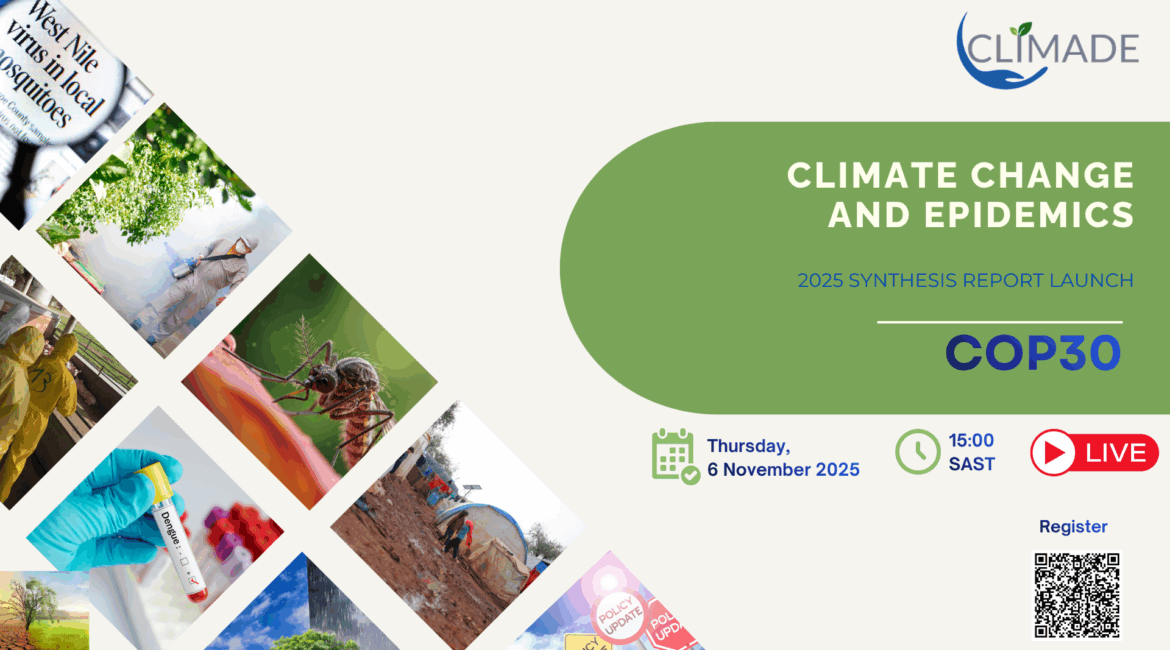Issued by Stellenbosch University on behalf of the Centre for Epidemic Response and Innovation (CERI
For media or launch event queries, contact Maambele Khosa, 079 592 9174 or maambele@sun.ac.za
Climate change and epidemics – 2025
Climate change is no longer a distant threat – it is here, reshaping ecosystems, intensifying extreme weather events, and testing the resilience of societies worldwide. Yet one of its most profound and overlooked consequences is its accelerating impact on infectious diseases.
This Thursday, 6 November 2025, the Climate Amplified Diseases and Epidemics (CLIMADE) Consortium will officially launch the CLIMADE COP30 Report, highlighting how climate change is fuelling new epidemics across the world. The event will be streamed live on YouTube and feature insights from leading scientists and global health experts working at the intersection of climate and disease.
Join CLIMADE in this urgent conversation and be part of shaping a more resilient, healthier, and sustainable future for all.
Date: Thursday, 6 November 2025
Time: 15:00 SAST | 13:00 GMT
Watch Live: https://youtu.be/Aj4hsL0pCMo?si=zkmU9jpKkjCrMqUi
Register for reminders: https://forms.office.com/r/XdHkRyc0RP
Access the Report: https://climade.health/climade-cop30-report/
While countries in the Global South contribute less than 10 percent of greenhouse gas emissions, they are likely to suffer the largest health impacts from climate change. Not only are these countries more at risk of climate disasters and harm, but they also have less adaptive capacity and preparedness to respond to these threats, making them highly vulnerable (low preparedness vs climate risk).
According to the authors of the report, the response to climate change should be used as an opportunity to build capacity to protect and support health, especially in underserved and underrepresented communities. As responsible policymakers, it is imperative that we acknowledge this reality and take swift, decisive action to mitigate the impending public health crisis.
The report was compiled by members of the CLIMADE (Climate Amplified Diseases & Epidemics) consortium. “The CLIMADE consortium brings together many of the leading scientific and public health groups worldwide, capable of decisively and rapidly responding to new epidemics amplified by climate change,” says Prof Tulio de Oliveira, Co-Lead of CLIMADE and Director of Centre for Epidemic Response and Innovation (CERI). “Our goal is to use science and collaboration to anticipate outbreaks before they happen – and to ensure that vulnerable communities are not left behind as the climate continues to change,” notes Prof de Oliveira.
The exacerbation of infectious diseases due to climate hazards can be attributed to both direct and indirect factors. The four main factors identified in the CLIMADE COP30 2025 Report, which collectively underscore that the climate-health nexus is no longer theoretical, are:
- Gradual Temperature Rise – creating conditions that extend the range of disease-carrying vectors, such as mosquitoes spreading West Nile virus and dengue.
- Evolving Pathogens – as environmental pressures change, viruses and vectors adapt, expanding into new ecological niches.
- Extreme Weather Events – droughts and floods act as catalysts for outbreaks, such as the 2023–2024 Oropouche virus expansion in the Amazon.
- Climate Migration – large-scale population movements caused by environmental stressors reshape exposure risks and strain fragile health systems, particularly across Africa and small island states.
The report also identifies the main actions that can be taken to decrease epidemics, urging governments, academic institutions, scientists, public health officials, private sector industries and health organisations to address the urgent and interconnected challenges of climate-amplified diseases and epidemics through their diverse expertise, and resources. The report authors call on the world to act now by:
- Strengthening Surveillance: Invest in genomic and epidemiological surveillance within a One Health framework to enable early detection and rapid response to emerging threats.
- Prioritising Vulnerable Communities: Direct resources toward those most affected by climate-linked health burdens, ensuring that equity and inclusion are at the heart of adaptation strategies.
- Committing to Sustainable Funding: Commit to long-term financing for research, data sharing, and capacity-building to anticipate and mitigate health impacts before crises unfold.
- Reporting Outbreaks Timeously: Encourage open, timely outbreak reporting and data exchange between nations and institutions to strengthen collective preparedness.
- Promoting Climate Resilience: Foster innovation, cross-sectoral partnerships, and integrated solutions that link climate adaptation and healthcare delivery.
ABOUT CLIMADE
The CLIMADE (Climate Amplified Diseases & Epidemics) initiative is a global consortium of leading global scientists and public health officials. CLIMADE focuses on bridging knowledge gaps, improving surveillance tools and expanding adequate interventions to decrease the impact of climate amplified diseases and epidemics. The overarching long-term goal of CLIMADE is to predict, track and control diseases and epidemics that are amplified by climate change in some of the most affected countries in the world. www.climade.health
ABOUT CENTRE FOR EPIDEMIC RESPONSE AND INNOVATION (CERI), STELLENBOSCH UNIVERSITY, SOUTH AFRICA
The Centre for Epidemic Response and Innovation (CERI) is a leading academic research centre focused on epidemic preparedness and response. CERI hosts the largest genomics facility on the Africa continent, and it is a specialised genomics facility of the WHO AFRO and Africa CDC. CERI is based at Stellenbosch University in South Africa. www.ceri.org.za
FOR MEDIA/LAUNCH EVENT ENQUIRIES
Maambele Khosa
Centre for Epidemic Response and Innovation (CERI
Stellenbosch University
Cell: +27 79 592 9174
Tel: 021 808 3815
Email: maambele@sun.ac.za

